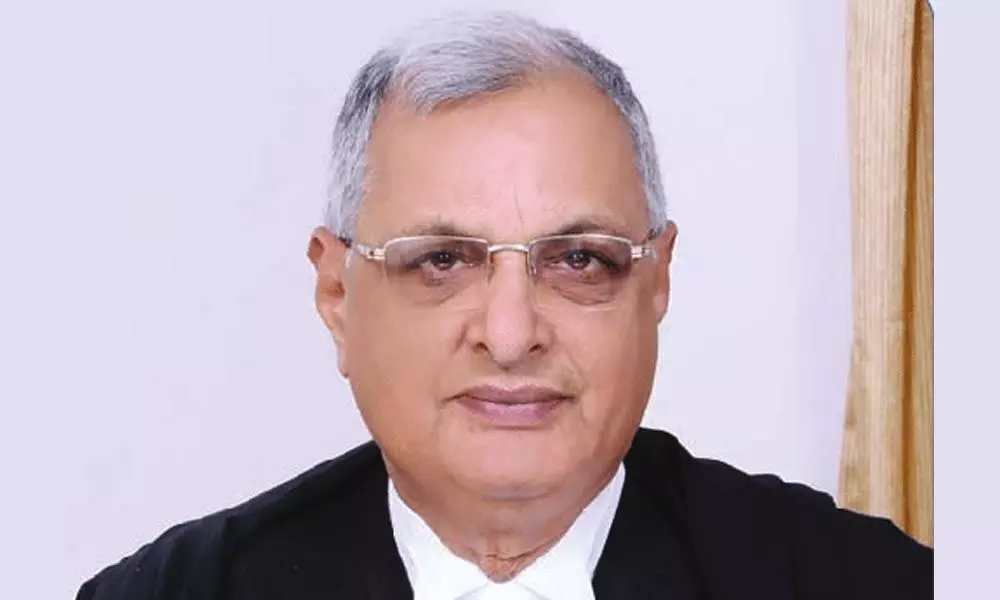Live
- Karnataka BJP Criticizes Siddaramaiah Over Wayanad Housing Project
- Lathi-charge on students in Hazaribagh kicks up political row; demand for CBI probe grows
- India’s growth to rebound to 7 pc in 2025-26: Report
- Delhi has decided to elect BJP CM, oust AAP govt: Harsh Malhotra
- Congress-led UDF winning streak continues in Kerala, ruling CPI-M-led Left suffers reversal
- The Key Players Behind IPL: Discover the Franchise Owners and Their Success Stories
- Harris and Gill join Sydney Thunders for WBBL 11
- PKL Season 11: Bengal Warriorz coach Surve aims for maximum points to secure playoff spot
- Manchu Vishnu Warns Media Over Family Controversy, Mohan Babu Incident
- Atul Subhash’s Suicide Sparks Outrage; Estranged Wife, Judge Accused of Harassment
Just In
There should be no objection to uniform civil code for India: former SC judge


Former Supreme Court judge Justice P C Pant on Saturday said there should not to be any objection to a common civil code for India
New Delhi: Former Supreme Court judge Justice P C Pant on Saturday said there should not to be any objection to a common civil code for India when there is no objection to laws like Special Marriage Act or those enacted by the British, which are applicable to everyone irrespective of religion.
He said that spreading awareness about the need for a common code through the medium of education will play a major role in broadening the outlook of people to accept UCC. "People have no objection to following laws made by the British or to the Special Marriage Act or the Juvenile Justice Act, which after amendment in 2006, allows Muslim couples to adopt a child even though the same is barred under their personal law. But they are objecting to a uniform civil code (UCC) for India," Pant said.
He was speaking at a seminar on 'Indian Civil Code - A Common Civil Law for all Indians' organised by the Bharatiya Matdata Sangathan which is headed by BJP leader Ashwini Kumar Upadhyay. Apart from him, Justice I A Ansari, former Patna High Court chief justice, and Justice Z U Khan, a former judge of Allahabad High Court, also spoke at the event which was also attended by Additional Solicitor General Aman Lekhi. Justice Ansari said that while uniformity in civil laws is a welcome move, people should also examine what can be changed within their own personal laws, like increasing Muslim women's share in inheritance from the present one third to half. "There will be always be resistance to change, but what we can change within our own laws should be changed," he said.
Justice Khan said a common civil code was a welcome and innovative concept and was required for ensuring gender justice, equality and dignity of women. He said a common code would help to provide justice to all. Lekhi, who also spoke at the event, said there was a provision under the Constitution for framing a UCC. He also said there was no need for the apprehension that a UCC would be applicable to a particular religious group and noted that it would be equally applicable to all. Apart from members of the legal community, Sanjay Paswan -- former minister of state of Human Resource Development, and actor-cum-BJP leader Gajendra Chauhan also spoke at the event and supported the proposal for a UCC. Upadhyay, also spoke at the event, saying there needs to be a discussion on the need for a common civil code and the seminar was just a step in that direction.
His organisation also circulated a resolution, for signatures from the audience, for discussion on the need for a UCC and which will be forwarded to the Prime Minister's Office. Upadhyay, also a lawyer, had in May this year filed a PIL in the Delhi High Court seeking direction to the central government to frame a UCC. Subsequently, similar pleas were moved by Firoz Bakht Ahmed, the chancellor of Maulana Azad National Urdu University, Amber Zaidi, who claims to be a social activist and media personality, and two others -- lawyer Abhinav Beri and Nighat Abbass, who claims to be a social activist, media panellist and political analyst. The high court is set to hear arguments in the matter on December 9. All the petitioners, in their respective pleas, have contended that India "urgently needs a Uniform Civil Code" to promote national integration as well as gender justice, equality and dignity of women.
The petitioners have contended that gender justice and gender equality, guaranteed under Articles 14-15 of the Constitution and dignity of women, guaranteed under Article 21 of the Constitution, cannot be secured without implementing the Article 44 (the State shall endeavour to secure for citizens a Uniform Civil Code (UCC) throughout the territory of India). The petitions have claimed that a UCC would replace the personal laws, based on the scriptures and customs of various religious communities, with a common set of rules governing every citizen of the country. The BJP, in its manifesto before the 2019 Lok Sabha Elections, had mentioned the UCC saying that Article 44 of the Constitution lists it as one of the Directive Principles of State Policy. The BJP believes that there cannot be gender equality till such time India adopts a UCC, which protects the rights of all women, and reiterates its stand to draft UCC, drawing upon the best traditions and harmonising them with the modern times, the manifesto said.

© 2024 Hyderabad Media House Limited/The Hans India. All rights reserved. Powered by hocalwire.com






